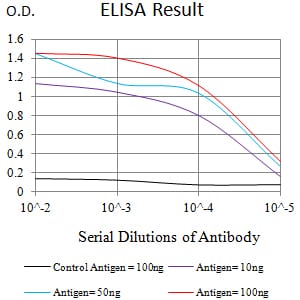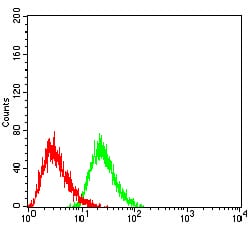

| WB | 咨询技术 | Human,Mouse,Rat |
| IF | 咨询技术 | Human,Mouse,Rat |
| IHC | 咨询技术 | Human,Mouse,Rat |
| ICC | 技术咨询 | Human,Mouse,Rat |
| FCM | 1/200 - 1/400 | Human,Mouse,Rat |
| Elisa | 1/10000 | Human,Mouse,Rat |
| Aliases | CLEC4D; MCL; MPCL; CLEC6; CLEC-6; CLECSF8; Dectin-3 |
| Entrez GeneID | 338339 |
| clone | 6E4H3 |
| WB Predicted band size | 24.7kDa |
| Host/Isotype | Mouse IgG1 |
| Antibody Type | Primary antibody |
| Storage | Store at 4°C short term. Aliquot and store at -20°C long term. Avoid freeze/thaw cycles. |
| Species Reactivity | Human |
| Immunogen | Purified recombinant fragment of human CD368 (AA: extra 39-215) expressed in E. Coli. |
| Formulation | Purified antibody in PBS with 0.05% sodium azide |
+ +
以下是关于CD368(TIM-3)抗体的3篇代表性文献,供参考:
---
1. **文献名称**:*TIM-3 in Cancer Immunotherapy: A New Target for Overcoming Resistance*
**作者**:Anderson AC et al.
**摘要**:探讨TIM-3(CD368)作为免疫检查点在肿瘤微环境中的作用,指出其抗体阻断可逆转T细胞衰竭,增强抗肿瘤免疫应答,尤其在PD-1耐药模型中显示出潜力。
---
2. **文献名称**:*Anti-TIM-3 Antibody Promotes T Cell IFN-γ-Mediated Antitumor Immunity*
**作者**:Sakuishi K et al.
**摘要**:通过临床前研究证明,抗TIM-3抗体可恢复耗竭T细胞的IFN-γ分泌能力,抑制肿瘤生长,并揭示其与PD-1通路的协同作用机制。
---
3. **文献名称**:*Combination Anti-TIM-3 and Anti-PD-1 Antibody Therapy Enhances Antitumor Efficacy in Murine Models*
**作者**:Ngiow SF et al.
**摘要**:在小鼠模型中验证联合使用抗TIM-3和抗PD-1抗体的治疗效果,显示双靶点阻断显著延长生存期,提示其在临床转化中的价值。
---
**备注**:CD368通常被认为是TIM-3的别名,相关研究集中于癌症免疫治疗领域。若需更具体的文献,建议通过PubMed或Web of Science以“TIM-3 antibody”或“CD368 immunotherapy”为关键词进一步检索。
×